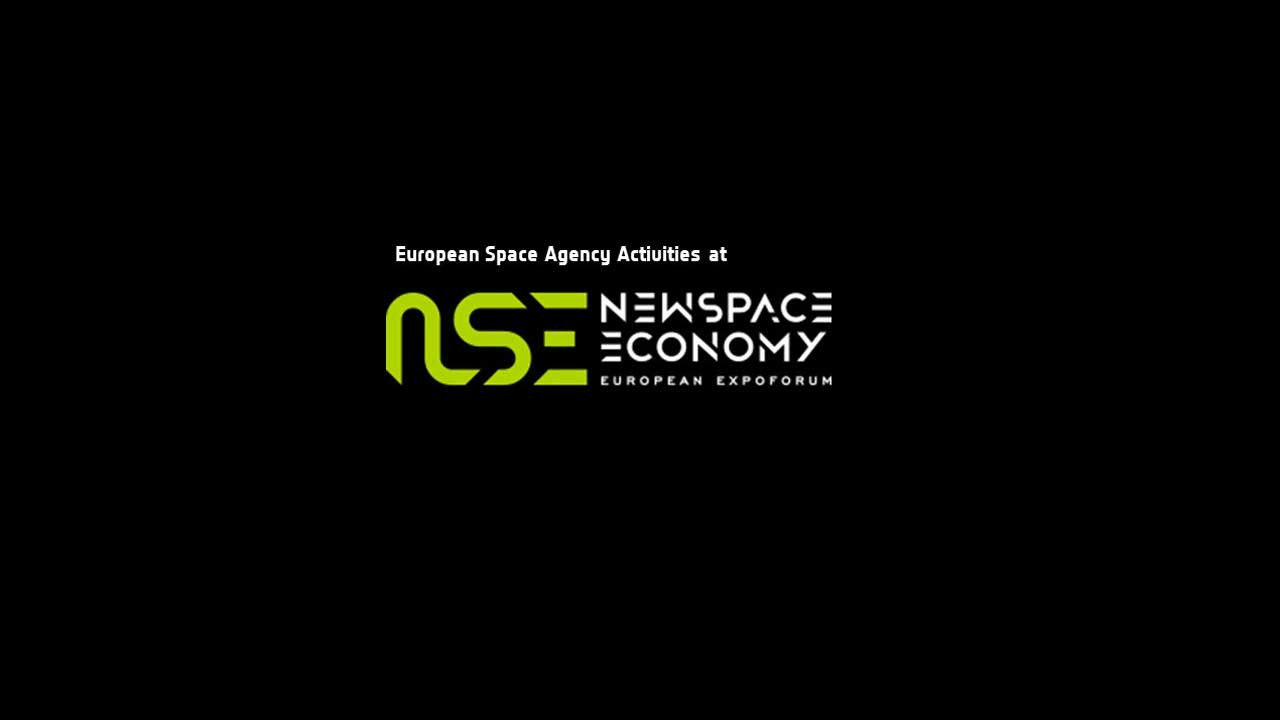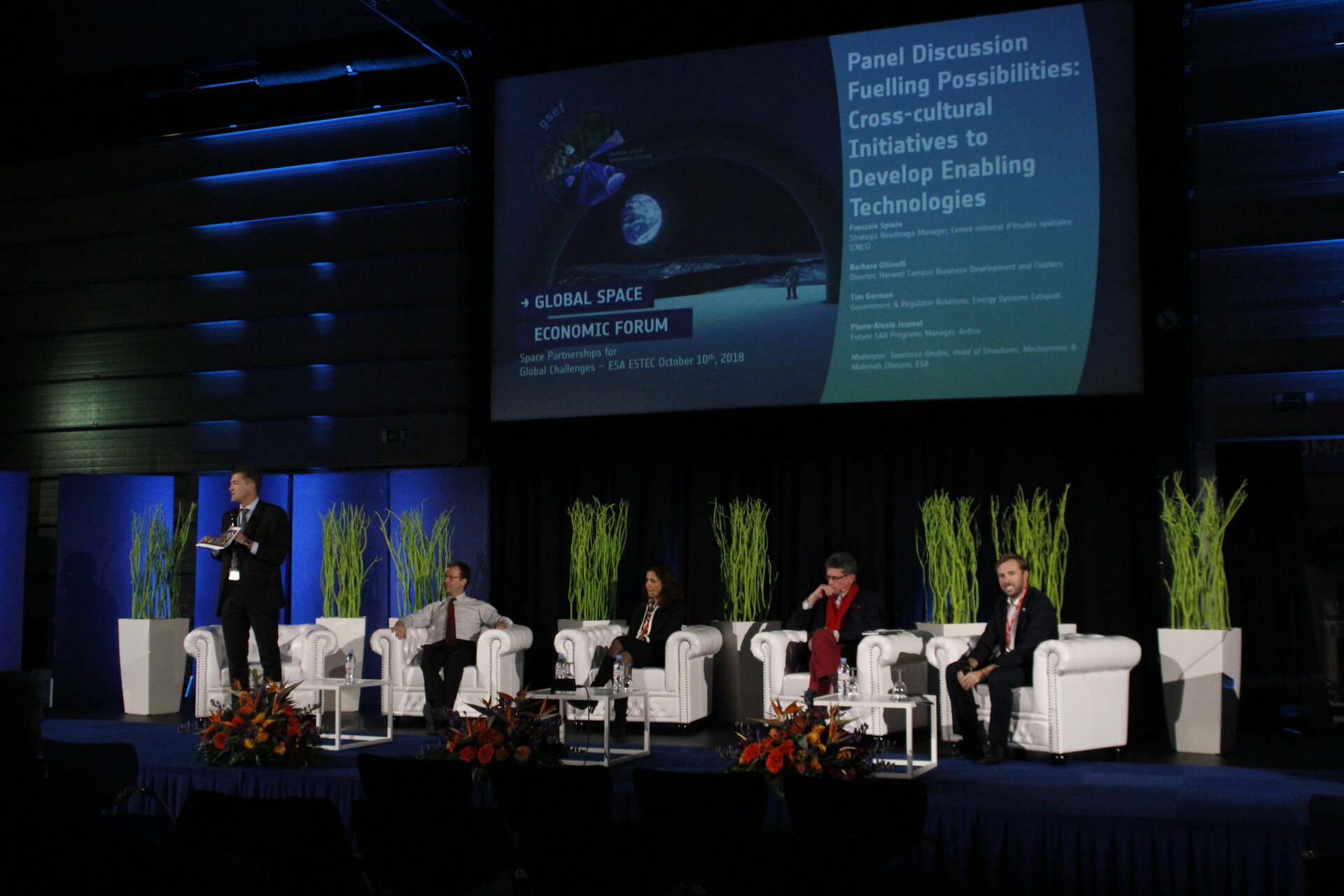
ESA at the New Space Economy European Expoforum • Nov 2019
On 10–12 December in Rome, ESA will be present at the New Space Economy European Expoforum (NSE) organised in collaboration with the Space Foundation. This event creates the opportunity to meet and exchange views with existing and new industrial players, small and medium-sized innovative companies, investors, new ventures, start-ups, research centres, space agencies and institutions with interests in space.
During these days, ESA will hold a number of events to address: smart cities innovation; collaborations with universities and research centres; access to investment; and worldwide competitiveness for European industry. View the agenda (.PDF).
On 11 December, there is the opportunity to attend in the second Global Space Economic Forum.
10 December - Day 1:

On 10 December, ESA will present downstream projects in the field of Smart Cities in the ESA Booth.
‘Downstream’ means all those activities based on space technology, or using a space-derived system in a space or non-space environment, that may result in an application, product or service to the benefit of the European economy or society.
Representatives from European industry will give presentations with ESA on developed industrial projects in the fields of new mobility, 5G, urban environment and cybersecurity.
Across the world, cities are struggling to provide critical infrastructure and urban services to support their fast growing, often unrelenting, growth.
The city of the future can be smart, green and connected. Behind many of the solutions necessary for developing Smart Cities and sustainable urbanisation, there are space technologies which are fundamental technological enablers such as using sensors and satellite connectivity, navigation systems, and Earth observation data.
Participants from industry, municipalities, academia and institutions will have the chance to meet and discover the opportunities offered by ESA in the area of Smart Cities.
11 December - Day 2:

ESA’s Global Space Economic Forum (GSEF) is the foremost creative platform to interactively discuss space-led innovation opportunities and the challenges arising from the on-going transformations driven by the space economy and the current and future trends in the global market.
More than 150 speakers and leaders from industry, institutions and academia will join this annual meeting to exchange ideas on global challenges and present innovative projects developed with ESA in areas such as cybersecurity, autonomous driving, urban innovation and artificial intelligence.
The theme chosen for the GSEF 2019 is 'Space creates value'. Space programmes are attracting public investments and increasingly more private investments.
These investments generate industrial activities that now play a daily part of citizen’s lives, in the domains of telecommunications, positioning, navigation and timing and Earth observation.
Markets for applications and services have been created and currently generate significant commercial value.
The GSEF will provide an opportunity to discuss how space activities foster industrial competitiveness, economic growth and innovation. Space and other industrial sectors can meet and create powerful benefits through cross-fertilisation.
The event will present the industrial projects launched during the Global Space Economic Workshop events organised in Italy and France in May 2019.
Access to finance for space in Europe

Private capital flows in the space sector have been steadily increasing in recent years. But while risk capital that targets tomorrow’s unicorns is at its most intense, the capital investment needs of established space SMEs have garnered less attention from investors and institutions alike. And yet space SMEs are critical players as building blocks of the value-adding and industrial supply chains in the space ecosystem.
On the one hand, early-stage companies are visible and active in their search for risk capital; even though they are riskier, the promise of return on investment for investors is proportionately more appealing. On the other hand, large heritage industry has no difficulty borrowing on commercial markets.
However, in between the two, established space SMEs are often less visible within complex value-adding chains. Their business (including with ESA), and the level of risk they entail, are less well understood by investors. When accessing capital, they must compete with peers in more established sectors such as pharmaceuticals and agriculture. When banks agree to lend, the conditions (maturity, interests, collaterals) are not favourable enough. In these conditions, they may be less able to compete for finance.
This event will take a closer look at the needs and specificities of supply and value-adding chain space companies as a potentially underserved segment of the space ecosystem. Stakeholders will discuss policy measures which could ease their access to finance, from soft mechanisms to build trust in the sector to innovative financing instruments which could address the specificities of space.
12 December - Day 3:
On 12 December there will be a discussion on competitiveness of the European space industry.
A first panel will introduce the ESA industrial policy tools in support of the growth of a sustainable European space industrial ecosystem.
In a second panel, representatives from the space industry will discuss the challenges presented by the globalisation of space markets.
Finally, two sessions will present the business opportunities for European space industry in the UAE and in Australia.
More articles of the category: Space Economy Articles
Space-based Solar Power: Contributing to achieving Net Zero...
Beyond Borders: Satellite Applications for Humanitarian Emer...
OECD Policy Paper: How the War in Ukraine is affecting Spac...
ESA Space Operations and Space Safety activities: supporting...
Seven Benefit Case Studies of ESA's Space Safety programme
ESA ARTES Partnership Projects, providing the satcom industr...
ESA Science Core Technology Development Success Story - Grou...
European Centre for Space Economy and Commerce (ECSECO) conc...
Europe decides to increase ESA’s budget by 17% compared to t...
The European Commission publishes the 2021 Edition of its Be...
OECD’s examination of Space Technology Transfers and their C...
PwC’s ‘Lunar market assessment: market trends and challenges...
FutureEO, critical enabler of EO benefits for the European e...
ESA TIA ARTES programme’s continuous boost to the commercial...
Terrae Novae: from inspiring Europe’s generations to support...
Exploiting the remarkable potential of space technology tran...
Technology developments for ESA science missions empowering...
Space Economy activities to support ESA Council at Ministeri...
ESA Space Economy Team presents a paper on “Statistic and th...
ESA-Eurostat workshop on a European Space Economy Satellite...
European Centre for Space Economy and Commerce (ECSECO) offi...
European Centre for Space Economy and Commerce (ECSECO) pres...
ESPI Yearbook 2021 – Space Policies, Issues, and Trends of t...
ESA Science Core Technology Development Success Story - Broa...
ESA Science Core Technology Development Success Story - Game...
ESA Science Core Technology Development Success Story - Fost...
ESA Science Core Technology Development Success Story - Crit...
ESA Science Core Technology Development Success Story - Unri...
ESA Science Core Technology Development Success Story - Firs...
ESA Technology Transfer Success Story - Closing the loop: ho...
ESA Technology Transfer Success Story - The missing layer: h...
ESA Technology Transfer Success Story - Cities as Spaceships...
ESA Technology Transfer Success Story - Space-style control...
ESA Technology Transfer Success Story - Using space heritage...
ESA Technology Transfer Success Story - No such thing as a w...
ESA Technology Transfer Success Story - Powering a village f...
ESA Technology Transfer Success Story - Space at home: using...
ESA Technology Transfer Success Story - Landing zone assessm...
ESA Technology Transfer Success Story - Uncovering the secre...
ESA Technology Transfer Success Story - From space debris to...
ESA Technology Transfer Success Story - Dry electrodes to mo...
ESA Technology Transfer Success Story - A new perspective: s...
Eurospace releases its annual Facts & Figures Report: The Eu...
ESPI Space Venture 2021 – Entrepreneurship and Investment in...
ECSECO open for membership registration on its official webs...
OECD's analysis of the impacts of Covid-19 on the Space indu...
Post-crisis scenarios for the space industry
Resilience of the space sector to the Covid-19 crisis
China’s Space Sector: Commercialisation with Chinese Charact...
The socio-economic value of satellite Earth observations: hu...
ESA Centre to develop Europe’s Space Economy and promote com...
The OECD Space Forum launches second phase of research oppor...
EARSC showcasing Copernicus uses for Environmental Complianc...
The OECD’s stand of “What is Impact Assessment”
Creation of the European Centre for Space Economy and Commer...
Value created by ESA's Space Systems for Safety and Security...
A closer look at the European Commission’s Guide to Cost-Ben...
EUSPA publishes EO and GNSS Market Report 2022
BEA’s “Estimating the United States Space Economy Using Inpu...
A closer look at the latest Earth Observation Services Indus...
ESPI Yearbook 2020 – Monitoring the development of the Europ...
EARSC workshop showcasing 24 Copernicus Sentinel value case...
SPAC and the Space Industry
G20 Space Economy Leaders Meeting 2021
ESA joins the Universeh inaugural conference to address the...
OECD’s approach to space sustainability and the economics of...
ESA announces winners of the Global Space Markets Challenge
Global Space Markets Challenge: Longlists announced
Top 12 companies selected in Global Space Markets Challenge
The Size & Health of the UK Space industry in 2019
Global Space Markets Challenge Competition
Copernicus Sentinel data supporting the pulp and paper indus...
Entrepreneurship and private investment trends in the Europe...
Metalysis–ESA Grand Challenge: team Malt wins first phase
Space Architecture: Economic impacts, future developments an...
ESA_Lab@UCLan: Assessing the public value of ESA programmes
ESA_Lab@Kozminski: A new bird in the nest of ESA_Lab
Call for participants: OECD's initiative on the value and su...
Financing SMEs: options for SMEs and Midcaps in Europe
Copernicus Sentinel Data supporting wine making in France
ESA_Lab@PoliBa: De’ remi facemmo ali
OECD’s analysis of the impacts of Covid-19 on the space indu...
Financing space: options for SMEs and midcaps in Europe
Discussing impact assessment of Big Science projects during...
ESA and Metalysis Organised the First Grand Challenge Midter...
Why it is important to keep investing in space during and af...
The benefits of Copernicus’ Sentinel data to society, enviro...
Join the First Online Global Space Economic Workshop
Join the Third Online Global Space Economic Workshop
Join the Second Online Global Space Economic Workshop
Watch again the GSEW Online
A closer look at OECD’s methodology for assessing the scient...
Non-space business? We want to hear from you
Discussing solutions at the Global Space Economic Workshop
The Covid Crisis: for European SMEs, this could be a breakth...
Value created by ESA's Clean Space Initiative
Value created by ESA's Ground Systems Engineering and Operat...
Value created by ESA Science Programme
Value created by ESA's Future Earth Observation Pillar
Value created by ESA Telecommunication Partnership Projects
ESA and Metalysis decide to suspend temporarily the Grand Ch...
Two Teams Competing for a Half-million Prize
Watch again the GSEF 19
Interview with Eric Morel de Westgaver on Europe's space eco...
Global Space Economic Forum: Space Creates Value
ESA at the New Space Economy European Expoforum
Kick off of Metalysis – ESA Grand Challenge: the Race to Min...
ESA Grand Challenge rewards solutions to complex problems
Advancing the understanding and measurement of the societal...
ESA Space Economy Brochure
The socio-economic impact of space activities
Space cybersecurity for smart cities
Setting the stage
Compete in a lunar economy
Last chance to join the competition
Interview with Giulia Pastorella on cybersecurity
Interview with Guglielmo Baeli on the oil and gas sector
Interview with Vincent Bastide on construction
Global Space Economic Workshop
Global Space Economic Workshop
Building cybersecurity at the Global Space Economic Workshop
ESA announces first Global Space Economic Forum
Welcome to the Global Space Economic Workshop
ESA Global Space Economic Forum
What is the Space Economy?
Measuring the Space Economy
Creating value
Challenges of future urban settlements on the Moon and Mars
Building and powering by disruptive innovation
Space workshops to power urban innovation
ESA at Station F: looking for applications to the first Gran...
Game changers for the ESA Grand Challenge
The Moon Race: Pioneering Sustainable Lunar Exploration
Metalysis–ESA Grand Challenge launched
A community of innovation at the Farnborough Airshow and ESA
Join us at Le Bourget to discuss space for commercial purpos...
Fuel the future by joining the Innovation Exchange
